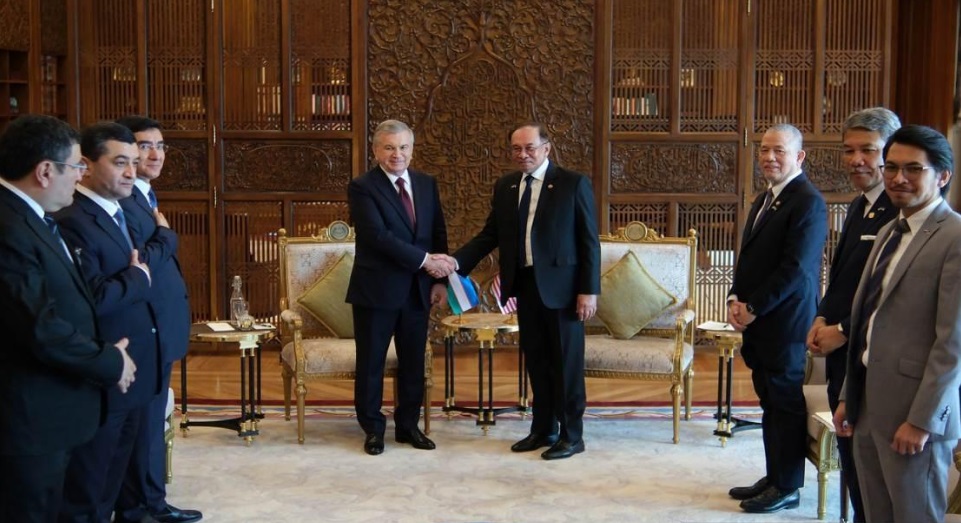
Malaysian Investment, Trade and Industry Minister Tengku Datuk Seri Zafrul Abdul Aziz urged Malaysian and Uzbek companies to forge collaborations to reap the synergistic opportunities offered by both countries, following several business-to-business (B2B) and government-to-business (G2B) discussion sessions on key industries, paving the way for new strategic partnerships.
“There were also several memoranda of understanding (MOUs) signed between our entities for promising projects, including in electronics and semiconductors, automotive industry, hydropower and solar energy, chemical industry, food industry and pharmaceuticals that will facilitate the development and growth of both our economies and industries,” he said.
The minister also highlighted that Malaysia – as a dynamic hub for manufacturing and services – boasts excellent infrastructure, strong connectivity and a highly skilled talent pool across various fields.
At the same time, he opined that this will especially benefit Malaysia’s small and medium-sized enterprises (SMEs) sector as they continue to become increasingly integrated into global supply chains.
“They offer a wide range of products and services, spanning manufacturing, technology, agriculture and logistics while showcasing innovation, resilience and adaptability. The highly competitive and capable Malaysian SMEs will make reliable partners for Uzbekistan companies in enhancing their own supply chain operations, whether for materials sourcing or expanding distribution networks in the region,” he said.
Meanwhile, Tengku Zafrul is encouraged by the strong interest from Uzbekistan in fostering closer ties with Malaysia across multiple sectors, primarily to learn from Malaysian experience and expertise as well as to build partnerships for industrial development.
“As one of the youngest and fastest growing countries in the world with a gross domestic product (GDP) growth rate of between 5.5% and 5.8% forecast for the next three years and a series of comprehensive reforms aimed at modernising the economy and improving governance, Uzbekistan’s economy is on a positive trajectory and is poised to maintain a robust expansion,” he added.
At the same time, establishing the industrial zone between the two countries will pave the way for the introduction of best practices and expertise in the development and operation of industrial parks.
“In addition, this will also foster collaboration in attracting management companies, park managers and other investors for participation in the planning and development of the industrial zones in Uzbekistan,” the two countries agreed in a statement during bilateral talks between Malaysian Prime Minister Datuk Seri Anwar Ibrahim and Uzbekistan President Shavkat Mirziyoyev.
Apart from that, both leaders also emphasised the importance of enhancing economic cooperation in key sectors such as renewable energy, the halal industry, digitalisation, artificial intelligence (AI), smart city development and startup development, among others to yield mutual benefits for both countries.
“Both leaders also expressed their interest to explore partnerships in the palm oil industry,” the statement said.
Meanwhile, Uzbekistan has reaffirmed its keen interest in collaborating with Petronas, particularly in the areas of the petrochemicals sector and clean energy solutions.
“Petronas is pleased to support this endeavour by establishing cooperation in terms of technical support, exchange of information and consultation for the related area of interest, while also exploring opportunities for the joint implementation of mutually beneficial investment projects,” it said.
Previously, during Anwar’s official visit Uzbekistan in May 2024, the Uzbek side expressed its interest in collaborating with Petronas, particularly through the methanol-to-olefins (MTO) and derivatives project as well as in the green hydrogen and associated derivatives production, including green ammonia.
It also welcomed Petronas’ potential contribution to the training of Uzbekistan personnel in the oil and gas sector.
Meanwhile, both leaders also agreed to strengthen cooperation by taking advantage of the ‘Visit Malaysia 2026’ and exploring opportunities in Islamic and Halal tourism. This includes the ‘Umrah+’ programme to promote Malaysia and the Republic Uzbekistan as pre- or post-pilgrimage tourism destinations for visitors from both countries.
“Both leaders agreed to utilise the direct Kuala Lumpur-Tashkent flight of Uzbekistan Airways and Batik Air Malaysia to enhance transportation accessibility,” it said.
Last year, Malaysia’s total trade with Uzbekistan was RM369.8 million (US$80.9 million), a slight decline of 13.2% from the RM426.1 million (US$94 million) recorded in 2023. The trade balance is in Malaysia’s favour at RM360.3 million (US$78.9 million).
























